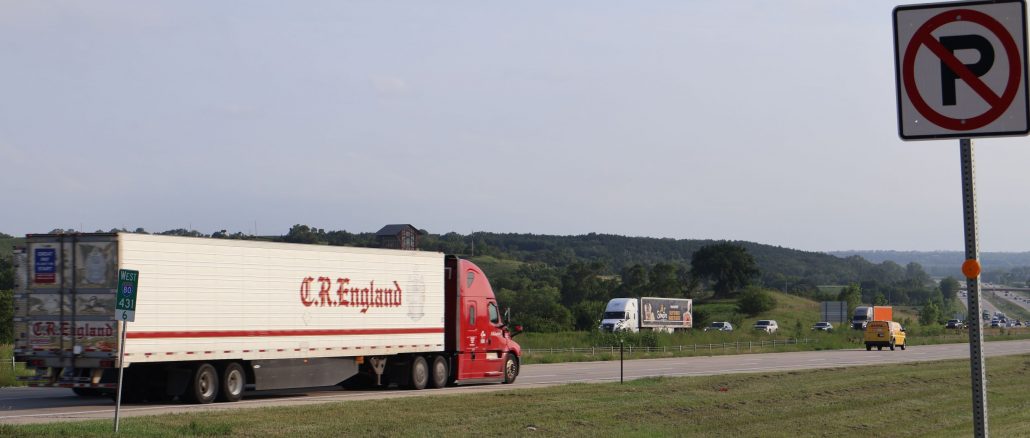
By GTM Staff (July 10, 2025)
WASHINGTON, D.C. — A worsening shortage of semi-truck parking across the United States has reached a critical point, threatening both road safety and the well-being of truck drivers, according to new research released by the American Transportation Research Institute (ATRI) and the Council of Supply Chain Management Professionals, supported by data from the U.S. Bureau of Transportation Statistics (BTS).
The research paints a sobering picture: there is currently only one public truck parking space for every 11 truck drivers nationwide—a disparity that is intensifying as freight volumes grow and e-commerce accelerates.
“Truck parking shortages are more than an inconvenience. They are a national safety concern,” the BTS report states. With trucks moving more than 73% of the nation’s goods by value, ensuring safe and accessible parking is essential for a functioning supply chain.
Safety at Risk
Federal hours-of-service regulations require truck drivers to take mandated rest breaks, but with limited parking options, many drivers are forced to choose between violating those rules or parking in unsafe and unauthorized areas such as road shoulders, ramps, or vacant lots.
This creates significant safety risks. Drivers parked in these improvised locations are vulnerable to accidents, and parked trucks on shoulders can contribute to roadway damage and increased maintenance costs.
“The lack of safe parking leads tired truck drivers to either keep driving or stop in unsafe places. Neither option is acceptable,” the BTS report warned.
ATRI’s 2025 Findings
The ATRI’s July 2025 study, developed in partnership with the American Association of State Highway and Transportation Officials (AASHTO), surveyed all 50 state Departments of Transportation. Among the key findings:
- Only 26% of states have acquired new land for truck parking in the last decade.
- 64% have explored repurposing existing facilities, such as weigh stations and park-and-ride lots.
- The average rest area has just 19 truck parking spaces, with regional disparities—from 25 spaces per rest area in the South to just 15 in the Northeast.
The three most cited barriers to expanding truck parking are lack of funding (36%), community pushback (27%), and difficulty finding suitable land (25%).
A separate driver survey within the ATRI report revealed that 54% of drivers who parked at weigh stations lacked access to basic amenities like restrooms. Many drivers also avoid weigh stations due to fears of surprise inspections, which can disrupt delivery schedules.
Technology and Real-Time Info Gaps
Although 60% of states have implemented or are planning Truck Parking Information Management Systems (TPIMS) to provide real-time updates on space availability, only 34% of drivers reported actually using the data, and nearly a third found the information unreliable.
“We have the technology, but it needs to be dependable and more widely adopted,” the ATRI report noted.
Rising Costs and Funding Gaps
On the financial side, the median cost to construct a single public truck parking space is $93,500. Meanwhile, the average state spends about $5 million annually on rest area service and maintenance—roughly $179,630 per facility.
While 84% of states lack dedicated funding for truck parking, 40% have applied for federal grants. Between 2022 and 2024, nearly $752 million in federal funding was awarded to truck parking projects through various U.S. DOT initiatives.
A New Planning Approach
The ATRI report also introduced a new Public Truck Parking Dashboard, allowing states to evaluate their capacity relative to mileage, truck volume, and proximity to major freight corridors. For example, Massachusetts—with 799 truck spaces—has 24 truck parking spaces per 100 miles of National Highway System roadways, and a 1:1.5 public-to-private parking space ratio.
“State DOTs strive to deliver the most safe, effective, and efficient transportation network possible,” said Shayne Gill, AASHTO’s Program Director for Multimodal Transportation. “Truck parking is a key part of that mission.”
Looking Ahead
As freight traffic grows, industry leaders warn that the gap between demand and supply will only widen without major infrastructure investments and policy support as the truck parking shortage becomes more of a national safety crisis.
“ATRI’s research underscores the importance of public sector truck parking and provides multiple tools for states to evaluate their progress,” said Alix Miller, CEO of the Florida Trucking Association.
In a logistics-driven economy where truckers are the backbone of the supply chain, safe parking isn’t just a courtesy—it’s a necessity.